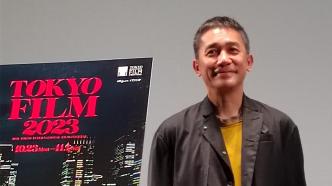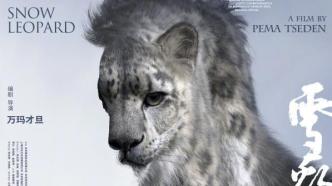
On the afternoon of November 1, the 36th Tokyo International Film Festival came to an end. This year's winner of the Sakura Award for Best Film (Golden Kirin Award) is "Snow Leopard", the posthumous work of the late Chinese director Wanma Tseden. In addition, Chinese new director Gao Peng's "Old Gun" won the Best Artistic Contribution Award.
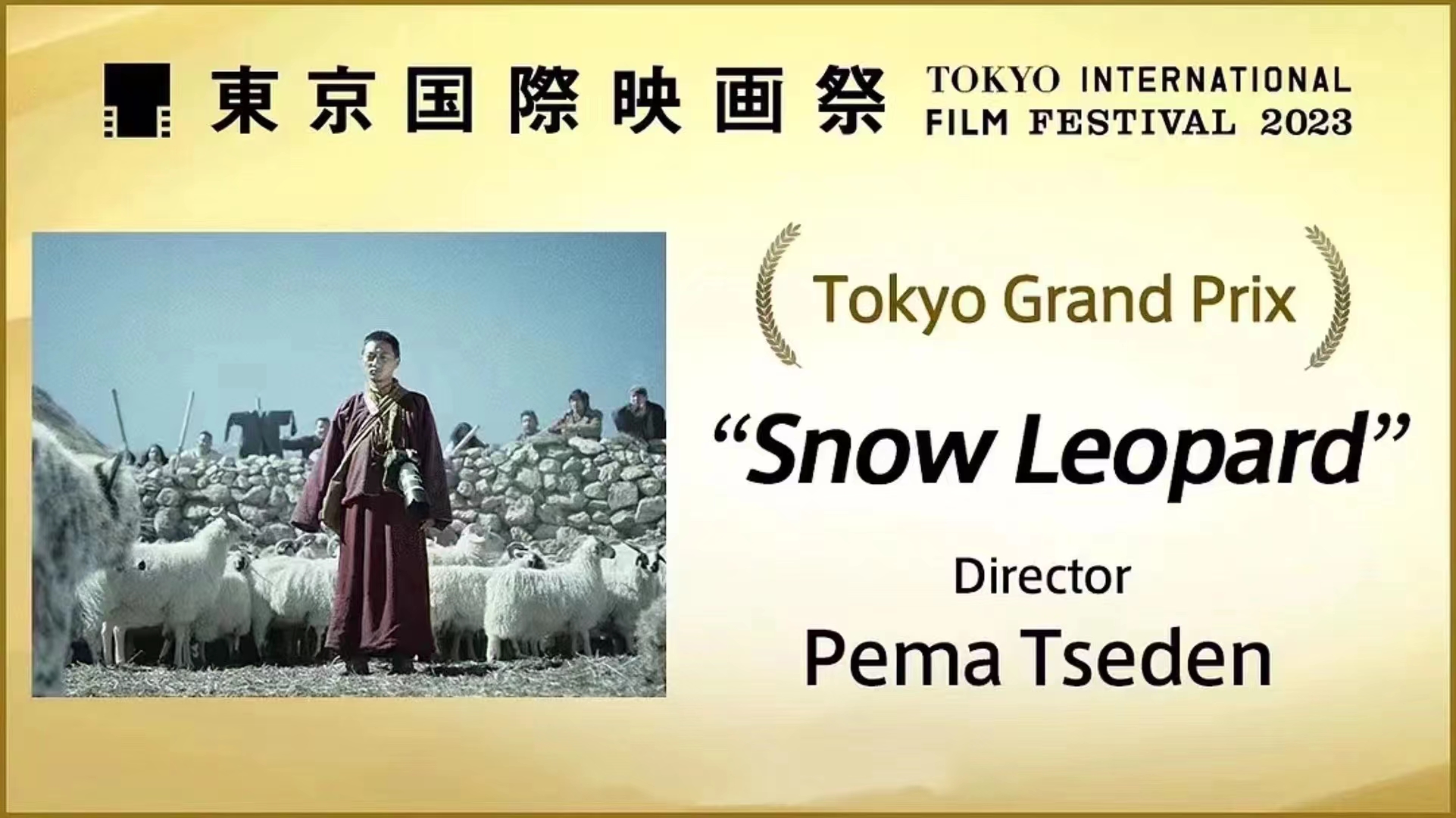
Wanma Tseden's posthumous work "Snow Leopard" won the best film at the 36th Tokyo International Film Festival
Chinese elements fill this Tokyo International Film Festival
After the epidemic, this year's Tokyo International Film Festival has returned to normal, and its scale is no less than before. It is particularly worth mentioning that the Chinese elements in this Tokyo International Film Festival are quite rich and distributed in all aspects.
First of all, for this year’s main competition unit, the famous director Wim Wenders, one of the four heroes of the “New German Cinema”, serves as the chairman of the jury. The judges include Spanish director Albert Serra and Japanese producer Mizue Kunisuke. , Vietnamese producer Tran Thi Bich Ngoc and Chinese actor Zhao Tao. This year's Lifetime Achievement Award was won by Zhang Yimou, who received the award at the opening ceremony of the film festival on October 23. The Tokyo International Film Festival also arranged for the screening of "River Red" and held a Zhang Yimou master class. In addition, the famous Hong Kong actor Tony Leung Chiu-wai also visited the Tokyo International Film Festival to attend the master class. "2046" starring him also had a special screening during the film festival.
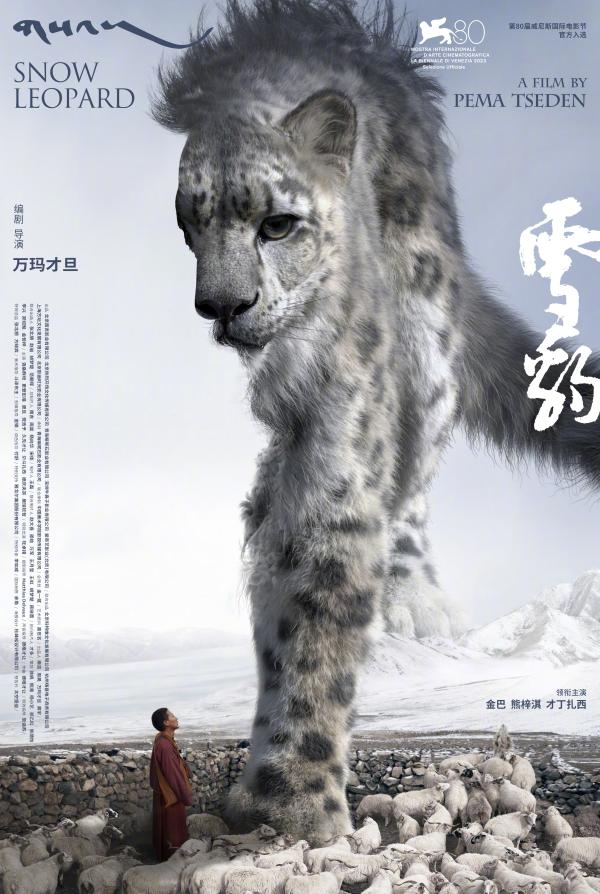
"Snow Leopard" poster
In the most watched main competition unit, three Chinese films were shortlisted this year, namely "The World" directed by Gu Xiaogang and starring Wu Lei, Jiang Qinqin, Chen Jianbin and Wang Jiajia; "The World" directed by Gao Peng and starring Zu Feng, Qin Hailu and Zhou Zhengjie "Old Gun"; director Wanma Tseden's posthumous work, "Snow Leopard" starring Kimba, Xiong Ziqi and Tsaidin Tashi. Among them, Gu Xiaogang is also one of the winners of this year's Kurosawa Akira Award. During the film festival, he had a conversation with Japanese national treasure director Yoji Yamada, and his work "Spring River Plumbing" was highly recognized by the latter.
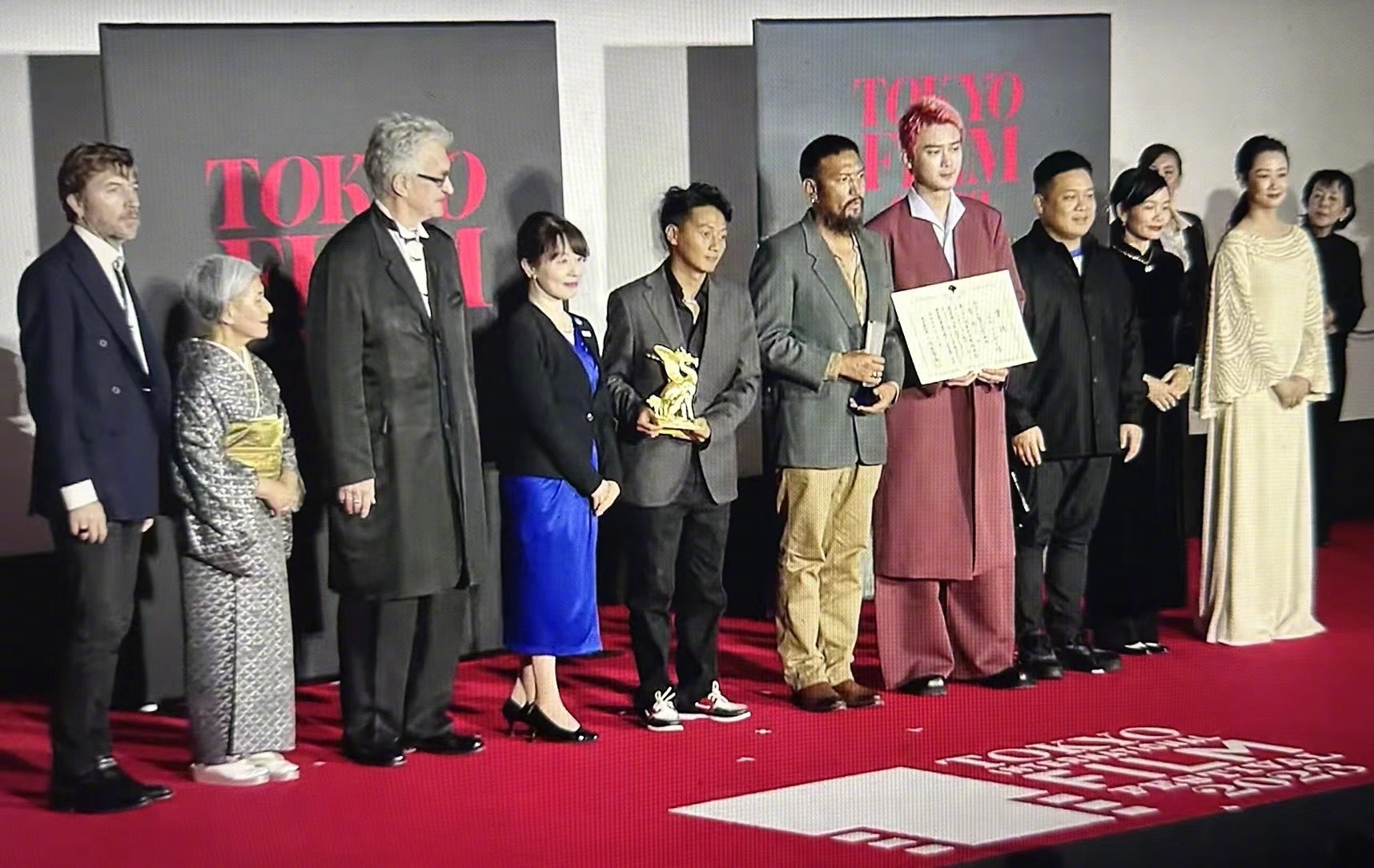
The cast of "Snow Leopard" poses with the judges of this year's Tokyo Film Festival. Picture from: Jia Zhangke Weibo
At the Tokyo International Film Festival's permanent Chinese Film Week, "The Lost Her" won the Golden Crane Award for Best Film, and "The Road to Hope" won the Jury Prize. Liu Ye and Ni Ni won the Grand Jury Prize for their films in "The Road to Hope" and "The Road to the Past" respectively. Her" won the Best Actor and Actor Award, Hou Yong, the director of "Wang Dao", won the Best Director Award, "Warm" was named the most popular film, "Chang'an 30,000 Miles" won the Best Animation Award, and the Kunqu Opera film "Handan won the Artistic Contribution Award, and Peng Wei, director of "Summer and Winter", won the Best New Director Award.
Newcomer's new work "Old Gun" is the biggest surprise
"Snow Leopard", director Wanma Tseden's posthumous film starring Jinba, Xiong Ziqi, Caiting Tashi and Wangzhuocuo, tells the story of a snow leopard that broke into a herdsman's sheepfold and killed nine Jie sheep. Dealing with the snow leopard sparked a confrontation between father and son. The film was previously screened at the Venice Film Festival, where it received positive reviews from many film critics present.
As for The Paper’s reporters, the biggest surprise they received at this year’s Tokyo International Film Festival was undoubtedly the film “Old Gun.” I first learned about this work through an article titled "After the Director Disappeared" on the public account "Positive Connection", which mentioned that the film was about to start production, but encountered a lockdown, the director was isolated, and the crew was suffocated in the hotel. When the epidemic slowed down and the snowy season set in the original script had long passed, the creators hesitated whether to film or not, and finally decided to face the difficulties. I didn't expect that such a movie that was almost impossible to make would be on the stage of the Tokyo International Film Festival.

"Old Gun" poster
The outside of the play is wonderful, and the story inside the play is also good. The film is set against the backdrop of the transformation period in the 1980s and 1990s. It tells the story of a large steel plant in the Northeast that was about to cease production, leaving the security department alone to guard the plant. The protagonist Gu Xuebing, played by Zu Feng, was once an athlete on the national shooting team. Unfortunately, due to physical reasons, he returned to the factory to work as a security officer. He struggled every day with gangsters who wanted to steal public assets from the factory and sell them off and turned a blind eye. One of his colleagues polishes his homemade pistol and daydreams about returning to the shooting team. One day, he generously released the arrested young man Geng Xiaojun (played by Zhou Zhengjie), who unexpectedly turned out to be the son of his crush (played by Qin Hailu). He took the responsibility of teaching young people to take the right path, but found that it was difficult for him to make the right decision in some matters. In the end, he had to burn out his meager strength when tragedy happened.
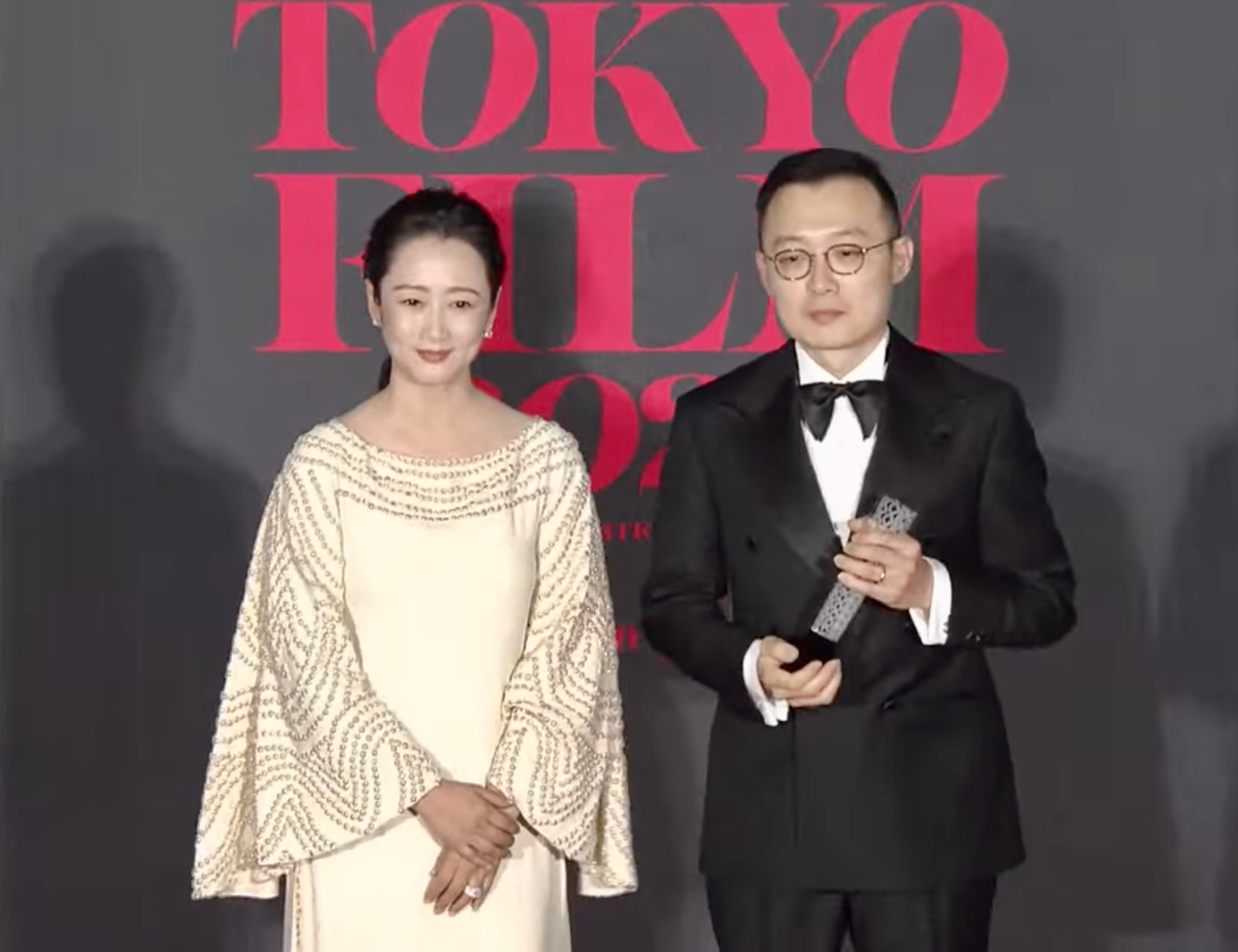
Zhao Tao, the judge of the main competition unit of this year's Tokyo Film Festival, awarded the Best Artistic Contribution Award to Gao Peng, the director of "Old Gun". Picture from: Jia Zhangke Weibo
"Old Gun" is the first feature film of young director Gao Peng. At the audience meeting after the premiere, he said: "The story of this movie took place in the 1980s and 1990s. For China, it was the beginning of a huge change; for me personally, it was the beginning of a huge change for me. boyhood. I think when we recall some things from childhood, they are all fragmented and visual, rather than logical and event-based. But as adults, because we have an understanding of history and society, we will All these memories are integrated; when all those fragments are connected, you will understand what happened at that time and what the society was like at that time. At the same time, I am always particularly interested in the athlete group, because in China, especially In that era, they were very different. So I think if such a person is used to tell the story of an era, it might be very interesting and extreme."
Faced with the invitation from new director Gao Peng, lead actor Zu Feng joked about the reason why he accepted the role of Gu Xuebing: "I read the script first and found it very interesting. They told me that the director was a young man and it was his first time filming a long film. But when I met the director, I realized that he was no longer young (laughs). We talked for an afternoon, and he made me very confident that he could make this film well. "

From left to right: Zu Feng, Gao Peng, and Zhou Zhengjie took a group photo at the screening of "Old Gun" at the Tokyo Film Festival
Not only is the director making his first feature film, Zhou Zhengjie, who plays the other protagonist Geng Xiaojun in the film, is also a new actor. He revealed: "The first time I came into contact with the crew was when I was in my third year of college. At that time, I received an invitation from the crew to interview. What attracted me most to the character Geng Xiaojun was his unyielding energy and unyielding spirit. , I think that’s what I yearn for and like in my heart.”
Regarding how to prepare for the role, Zu Feng said: "The first step is to prepare mentally. This movie is actually about a story about growing up. Everyone has to grow up, and adults are no exception; in the process of growing up, We may need to lose something, or we may lose some principles or beliefs, which may be the price of growth. This movie does not give the answer. The answer lies in everyone's heart, and also in the heart of Gu Xuebing, who I play. The rest It’s some external preparations, such as shooting training. We went to a professional shooting team and studied with the coach for a period of time. There is also the understanding of that era, because I am not young anymore, so I have almost experienced that. Something about the era.”
In Gao Peng's view, Zu Feng's long-term experience in practicing calligraphy also greatly helped shape Gu Xuebing. "When I learned about shooting, I found that it is actually an inward sport that requires mental cultivation. It is not like ordinary sports that rely heavily on physical strength. It is a bit like Zen meditation."
When asked as an actor born in the 2000s, how to understand Geng Xiaojun who lived in the 1990s, Zhou Zhengjie said, "I was indeed born in 2000, but the time background of the 1990s in the movie is not difficult for me to understand. Because I I was born in a small city in Shanxi. The city I grew up in was full of coal, so I am no stranger to trains and tracks. Including the plot in the movie about sneaking into a factory through a train also evokes a lot of resonance for me. For The more difficult thing about understanding this character is to think about what Geng Xiaojun should do when he faces those changes and sudden events? The connection between his psychology and my own psychological construction is to shape this character. The hardest part.”
What makes people sigh is that the uncertain future faced by the crew turned out to be the catalyst for the actors' chemical reaction. Zu Feng said: "This is the first time for Xiaojie and I to work together, so we should be a bit unfamiliar, but by chance, we stayed together for two months before filming started, and during these two months, we became close. It was seamless, so the subsequent filming went smoothly.”
Jia Zhangke's Bole brings new changes to Tokyo International Film Festival
The reason why many new works by Chinese filmmakers have the opportunity to debut at the Tokyo International Film Festival this year must be the promotion of the new film selection director Naozo Ichiyama. It’s not that this producer, who is closely related to the Chinese film industry, is intentionally biased, but that he has a unique vision because of his thorough understanding.
From the beginning of his career until now, Naozo Ichiyama has maintained the dual identity of producer and film selector. He first worked as a producer at Songzhu Pictures, during which time he collaborated with director Hou Hsiao-hsien on three films: "Good Men, Good Women", "Southland, Goodbye Southland" and "Flowers of the Sea". After that, he switched to Takeshi Kitano Studio. During the 1998 Berlin Film Festival, he met Jia Zhangke, who was participating in the film festival with "Xiao Wu". The two began a 25-year cooperative relationship. All of Jia Zhangke's works after "Xiao Wu" were Naozo Ichiyama serves as the producer. It is not an exaggeration to call Ichiyama Shangzo Jia Zhangke's Bole, because after "Xiao Wu", Jia Zhangke's three works "Platform", "Ren Xiaoyao" and "The World" mainly relied on his financing to complete the filming.
On the other hand, Naozo Ichiyama has participated in the film selection work of the Tokyo International Film Festival since the 1990s; he founded the Tokyo Ginza Film Festival (FILMeX) in 2000; starting in 2021, he will serve as the film selection director of the Tokyo International Film Festival, responsible for daily various tasks.

During the Shanghai Film Festival in June this year, Jia Zhangke posted a photo on Weibo of him and Naozo Ichiyama (first from left) visiting director Yoji Yamada. Director Yamada is the chairman of the jury for this year's "Akira Kurosawa Award" at the Tokyo Film Festival.
In an interview with The Paper, Ichiyama Naozo first recalled his acquaintance with Jia Zhangke and why their cooperation has lasted for so long.
"When I was watching "Xiao Wu", I didn't know who Jia Zhangke was because it was his first feature film. After watching it, I felt that I really liked this movie because it was the same movie that I had watched before. Chinese movies are very different. At that time, most Chinese movies would choose big cities like Beijing and Shanghai as the stage for the story, but the story of "Xiao Wu" takes place in a small town. I found that the director of this movie is very good at capturing the moment. The atmosphere of the times, it was shot in Fenyang, Shanxi. I had not been there yet, but when I watched this movie, I felt that I was there - after I worked with Jia Zhangke, I went to Fenyang Yang, I found that the feeling was the same as when I first watched the movie."
“After watching the movie, I left the cinema without finding a chance to talk to the director. However, a few days later, I met him by chance in a restaurant. I told him that I was working with director Hou Hsiao-hsien—— It was in the middle of the filming of "Flowers of the Sea". Then Jia Zhangke told me the concept of his next film "Platform". He said that the filming cost of this film was relatively high, and he had not been able to find a director in China. There was enough investment, so I wanted to see if any foreign producers were willing to participate. I said, why don’t you send me the script to take a look.”
"In the process of talking with him, I found that he is a person with a good personality and is easy to deal with; and he is very straightforward and very enthusiastic about his work. I feel that I can completely trust him, which is very important for a producer. People are very important. If the producer and director cannot establish enough trust, it will cause big problems when they work together later. Speaking of which, if I had not gone to the Berlin Film Festival that year, I would have I wouldn’t have met Jia Zhangke; if we hadn’t had the chance to bump into each other in a restaurant, then I wouldn’t have known about his plans for his next film, and maybe we wouldn’t have collaborated at all. So, all of this must be due to some kind of fate.”
After Jia Zhangke won the Golden Lion Award at the Venice Film Festival for "The Good Man", he received support from France's MK2 and Shanghai Film Group, so he no longer had to worry about funds. In response to this, I was asked whether Naozo Ichiyama felt a little disappointed when he saw that the director he discovered gradually became famous and became less dependent on him as a producer? Ichiyama said frankly: "No, no, no, I didn't feel like I had lost anything at all. On the contrary, I breathed a sigh of relief. Because it was really difficult to find investment in China in the past, so I spent more on the budget for "Platform", "Ren Xiaoyao" and "The World". It requires a lot of work. But after "The Good Man", Jia Zhangke was able to find enough investment in China, and my workload was reduced. I think another important reason is that China's economy is developing rapidly. Many people Willing to pay for good works. Even so, we still worked together later. I think this is because even if Jia Zhangke does not have to worry about funds, he still hopes to have someone who can introduce his works to Japan, Europe and other parts of the world. .So, not only do I not feel like I have lost anything now, but I feel like I have been relieved of some burdens. Because compared to other things, finding people to invest is the most difficult thing.”
As for the difference between selecting films for the Tokyo Ginza Film Festival and the Tokyo International Film Festival, Ichiyama replied: "Actually, no matter which film festival I select for, I am committed to choosing good films. Speaking of these two film festivals The differences are, first of all, the main competition unit of the Tokyo Ginza Film Festival only targets Asian films, while the Tokyo International Film Festival selects films from all over the world. Also, the Tokyo Ginza Film Festival mainly involves new directors, although there is no specific requirement for directors. You are so young, but they are basically in the beginning stages of their careers. The Tokyo International Film Festival will have some directors who are already somewhat famous to participate. This does not mean that we select films based on their fame. Their works still come first. Yes, it’s just that the film festival itself will attract these people to submit works. For example, this year’s main competition section includes works by Aleksei German Ml., Barbara Albert and others. For new works, they have already participated in the Berlin Film Festival, Cannes Film Festival or Venice Film Festival.”

Gu Xiaogang, director of "The World of Grass and Trees", won the "Akira Kurosawa Award" at this year's Tokyo Film Festival
"However, the Tokyo International Film Festival is also open to young directors. For example, this year's main competition includes Chinese director Gao Peng's first feature film "Old Gun" and Gu Xiaogang's second feature film "The World of Grass and Trees." I think the young filmmakers shortlisted for the main competition are very capable and can compete with their mature predecessors."
Finally, Naozo Ichiyama said that since becoming the film selection director of the Tokyo International Film Festival in 2021, the workload has suddenly increased a lot. He did bring many changes to the film festival, such as moving the venue from Roppongi to Hibiya and Ginza areas; he also added online screenings and started cooperation with streaming media; overall, he made the Tokyo International Film Festival More advanced with the times.
This also makes it a bit difficult for Ichiyama Naozo to balance his role as another producer. Even so, he co-produced three films last year; now he is working on finding co-producers in Japan so he can continue to discover and support promising young filmmakers.
[List of winners of the main competition unit of the 36th Tokyo Film Festival]
Best Film Award: "Snow Leopard"
Judges' Special Award: "Judo Arena"
Best Director Award: Zenyuki Kishi for "Sure Desire"
Best Actress Award: Zara Aamir, "Judo Arena"
Best Actor Award: Yasna Mithamas, "Rohana"
Best Artistic Contribution Award: "Old Gun"
Audience Choice Award: "Right Desire"


